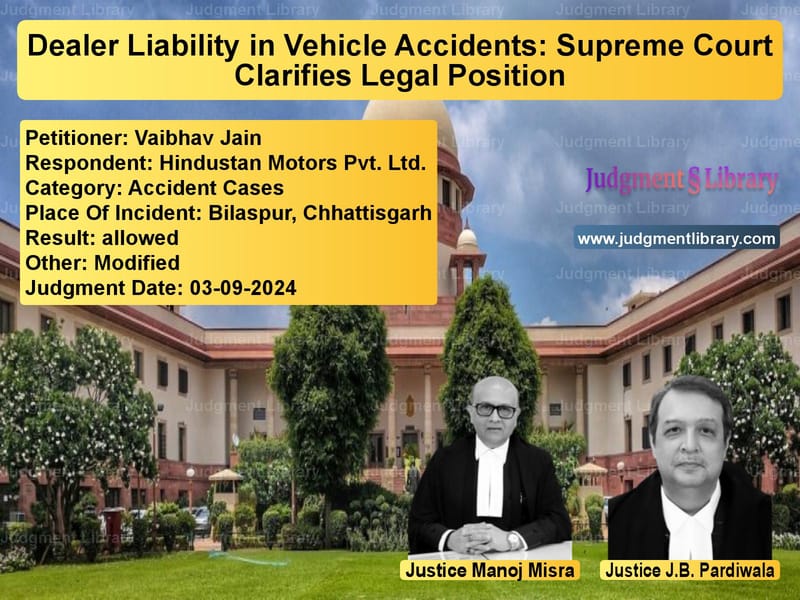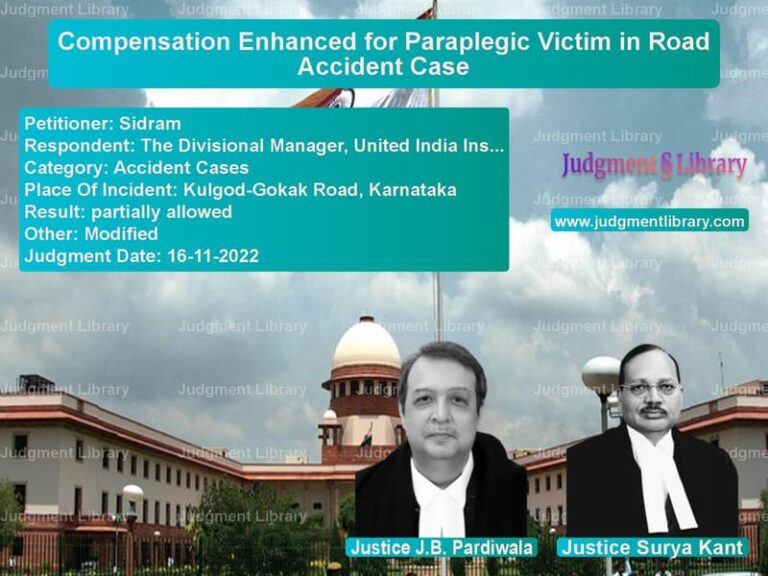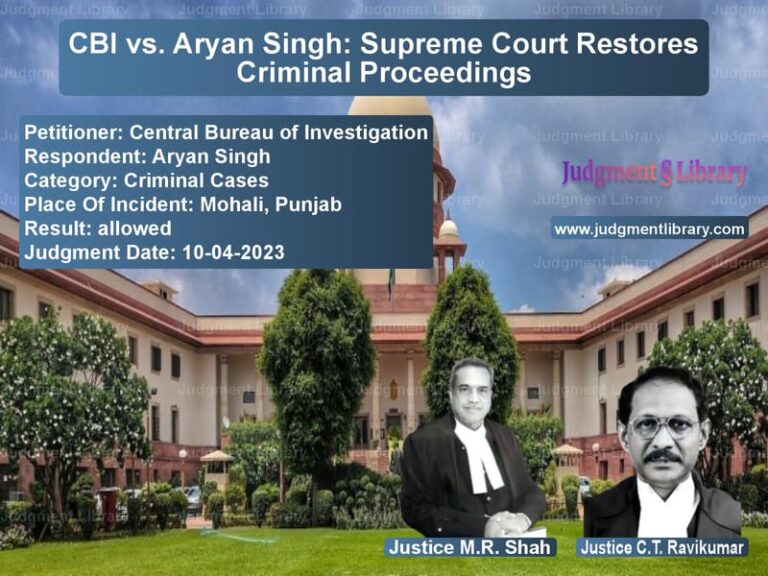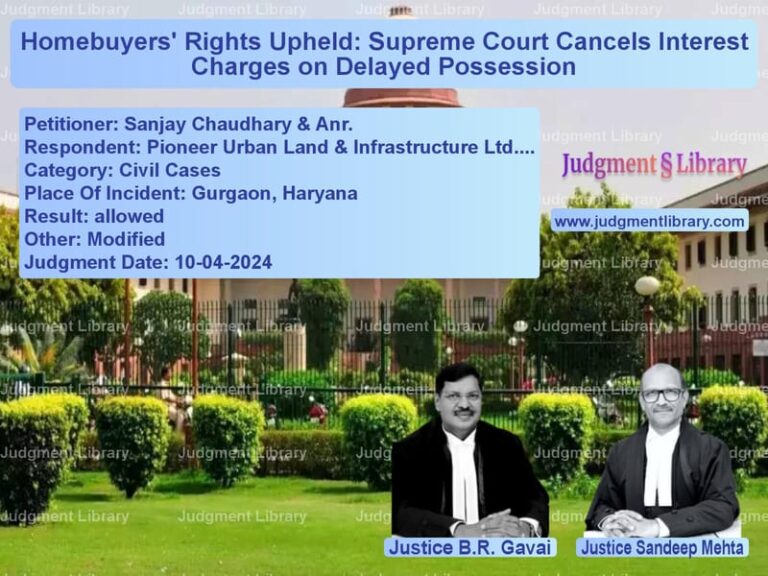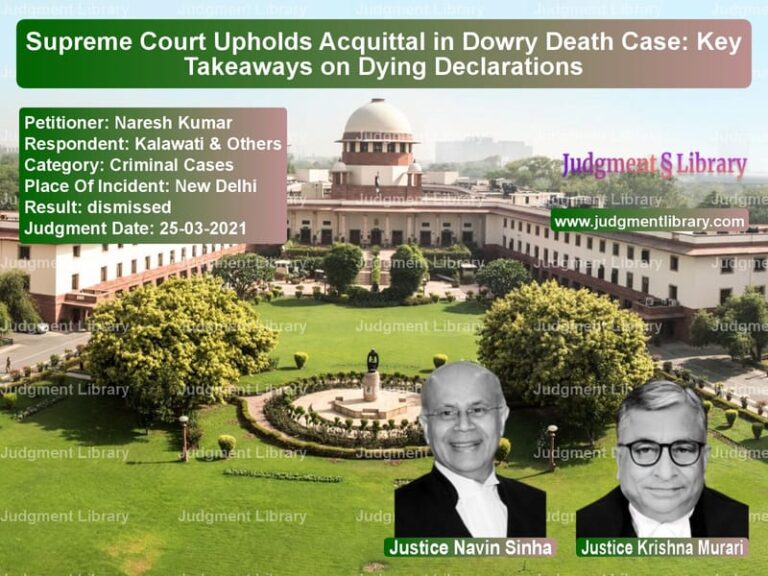Dealer Liability in Vehicle Accidents: Supreme Court Clarifies Legal Position
The case of Vaibhav Jain vs. Hindustan Motors Pvt. Ltd. revolved around the liability of a vehicle dealer in an accident where the vehicle was under the possession of a manufacturer’s employees during a test drive. The Supreme Court ruled that the dealer could not be held jointly and severally liable for the accident and that the primary liability rested with the vehicle manufacturer.
Background of the Case
The dispute arose when Pranay Kumar Goswami, an employee of Hindustan Motors, died in an accident while test-driving a vehicle. The claimants, his legal heirs, filed a claim under Section 166 of the Motor Vehicles Act, 1988, seeking compensation from:
- Shubhashish Pal (the driver and an employee of Hindustan Motors).
- Hindustan Motors Pvt. Ltd. (the vehicle manufacturer).
- Vaibhav Motors (the vehicle dealer).
The accident occurred when the vehicle was taken out for a test drive from Vaibhav Motors’ dealership, but it was driven by an employee of Hindustan Motors.
Key Legal Questions
The Tribunal framed the following key issues:
- Who was the actual owner of the vehicle at the time of the accident?
- Can a dealer be held jointly and severally liable along with the manufacturer?
- Did the dealership agreement absolve the manufacturer of liability?
Trial Court’s Decision
The Tribunal ruled that Hindustan Motors was the registered owner of the vehicle at the time of the accident, and Vaibhav Motors was merely in possession of the vehicle as a dealer. Despite this, it held both the manufacturer and the dealer jointly and severally liable for compensation.
Read also: https://judgmentlibrary.com/supreme-court-restores-compensation-in-motor-accident-claim/
High Court’s Ruling
Vaibhav Motors challenged the Tribunal’s decision before the Chhattisgarh High Court, arguing that:
- It was not the registered owner of the vehicle.
- The vehicle was being driven by an employee of Hindustan Motors.
- The manufacturer, and not the dealer, should bear liability.
The High Court dismissed the dealer’s appeal but enhanced the compensation amount awarded to the claimants.
Supreme Court’s Judgment
1. Determination of Ownership
The Supreme Court reiterated that under Section 2(30) of the Motor Vehicles Act, the owner is the person in whose name the vehicle stands registered. The Court stated:
“Hindustan Motors was the owner of the vehicle, and there was no evidence that it had been sold to the dealer at the time of the accident.”
2. Liability of the Dealer
The Court ruled that the dealer was not liable for the accident since the vehicle was in the control of Hindustan Motors’ employees at the time of the incident.
“The appellant, being just a dealer of M/s Hindustan Motors, was not liable for compensation as an owner of the vehicle.”
3. Interpretation of the Dealership Agreement
The manufacturer argued that clauses in the dealership agreement absolved it of liability. The Court rejected this, stating:
“Clauses 3(b) and 4 of the agreement limit the manufacturer’s liability for defects but do not exempt it from liability for accidents.”
4. Application of Order 41 Rule 33 CPC
The manufacturer sought relief under Order 41 Rule 33 of the Civil Procedure Code (CPC), allowing a non-appealing party to seek modification of a judgment. The Court rejected this argument, emphasizing:
“By not challenging the Tribunal’s finding on ownership, Hindustan Motors allowed it to attain finality and cannot now claim exemption from liability.”
Final Judgment
The Supreme Court ruled in favor of Vaibhav Motors, holding that it was wrongly held liable. However, since the Special Leave Petition (SLP) against the claimants was dismissed earlier, the Court could not alter the compensation order. Instead, it provided Vaibhav Motors the right to recover any amount it had paid from Hindustan Motors:
“If the awarded amount, or any part thereof, has been paid, or is paid, by the appellant, the appellant shall be entitled to recover the same from M/s Hindustan Motors along with interest at the rate of 6% p.a.”
Implications of the Judgment
The ruling sets an important precedent for liability in vehicle accidents involving dealerships:
- Dealers are not liable for accidents unless they are the registered owners or in control of the vehicle.
- Manufacturers cannot contractually absolve themselves of liability if their employees are operating the vehicle.
- Retroactive claims for liability cannot be raised under Order 41 Rule 33 CPC.
This judgment provides much-needed clarity on the legal responsibilities of vehicle manufacturers, dealers, and employees in cases of accidents during test drives.
Petitioner Name: Vaibhav Jain.Respondent Name: Hindustan Motors Pvt. Ltd..Judgment By: Justice Manoj Misra, Justice J.B. Pardiwala.Place Of Incident: Bilaspur, Chhattisgarh.Judgment Date: 03-09-2024.
Don’t miss out on the full details! Download the complete judgment in PDF format below and gain valuable insights instantly!
Download Judgment: vaibhav-jain-vs-hindustan-motors-pvt-supreme-court-of-india-judgment-dated-03-09-2024.pdf
Directly Download Judgment: Directly download this Judgment
See all petitions in Motor Vehicle Act
See all petitions in Compensation Disputes
See all petitions in Judgment by Manoj Misra
See all petitions in Judgment by J.B. Pardiwala
See all petitions in allowed
See all petitions in Modified
See all petitions in supreme court of India judgments September 2024
See all petitions in 2024 judgments
See all posts in Accident Cases Category
See all allowed petitions in Accident Cases Category
See all Dismissed petitions in Accident Cases Category
See all partially allowed petitions in Accident Cases Category

